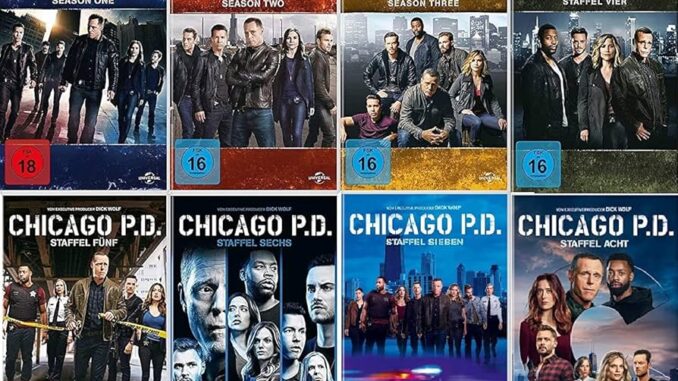
When Chicago P.D. first premiered in 2014, it was a raw, high-octane police drama that immediately set itself apart from other procedurals. A spin-off of Chicago Fire, the series introduced audiences to the gritty and often morally ambiguous world of the Intelligence Unit, led by the tough and unrelenting Sergeant Hank Voight. Over the years, Chicago P.D. has undergone a significant transformation—not just in terms of storytelling but also in its approach to character development, social themes, and the way it portrays law enforcement in an ever-changing world.
The Early Years: A Dark and Gritty Approach (2014-2017)
From the beginning, Chicago P.D. was never afraid to explore the harsh realities of police work. Unlike its predecessor, Chicago Fire, which balanced action with heartwarming camaraderie, Chicago P.D. took a darker approach. The first few seasons saw Voight and his team taking down dangerous criminals with little concern for bureaucratic red tape. Justice was often served through intimidation, bending the rules, and making morally gray choices that blurred the line between right and wrong. The show thrived on action-packed storytelling, shocking plot twists, and intense interpersonal dynamics. Characters like Erin Lindsay (Sophia Bush) brought depth and vulnerability, while officers like Antonio Dawson (Jon Seda) and Jay Halstead (Jesse Lee Soffer) provided balance to Voight’s extreme methods. At this stage, Chicago P.D. was still finding its footing, relying heavily on adrenaline-fueled narratives that kept audiences on the edge of their seats.

Mid-Series Growth: More Character Depth and Social Awareness (2018-2022)
As the show entered its middle years, a shift began to take place. By 2018, television audiences were demanding more accountability from the shows they watched, particularly when it came to the portrayal of law enforcement. The rise of real-world discussions about police brutality, systemic corruption, and racial profiling forced Chicago P.D. to adapt its storytelling approach. The Intelligence Unit began to confront the consequences of their actions more directly. Voight, once an untouchable force who ruled the streets with an iron fist, started facing challenges to his authority. New characters like Hailey Upton (Tracy Spiridakos) and Deputy Superintendent Samantha Miller (Nicole Ari Parker) brought fresh perspectives, questioning whether Intelligence’s old ways were sustainable in a modern police force.
Episodes started addressing real-world issues more frequently. Topics such as racial injustice, mental health, and the ethics of policing were woven into the fabric of the show, making it more than just an action-driven crime drama. At the same time, character development deepened, with storylines exploring the emotional toll of police work. This era also saw major cast departures, including the exits of Sophia Bush, Jon Seda, and later Jesse Lee Soffer. These changes forced the series to reinvent itself, proving that Chicago P.D. was more than just its original lineup.
Recent Seasons and 2025: A Fully Matured Police Drama
As Chicago P.D. moves into 2025, it has solidified itself as a mature and thought-provoking series. While the action and suspense remain core elements, the show now prioritizes a more balanced depiction of law enforcement. The Intelligence Unit still pursues justice, but it does so with greater self-awareness and moral complexity. Voight’s character has experienced one of the most significant transformations. Once feared for his ruthlessness, he has evolved into a leader who understands the weight of his past actions. Though he still operates in the gray area, he is more reflective, often struggling with the consequences of his decisions.
Additionally, newer characters have helped shape Chicago P.D.’s modern identity. The introduction of fresh perspectives has allowed the show to explore contemporary policing challenges while staying true to its roots. The team dynamics have also shifted, with each character playing a more defined role in shaping the unit’s future. Romance, friendships, and personal growth have taken center stage alongside crime-solving. Relationships like Burgess and Ruzek’s have endured hardships, adding emotional depth to the series. Meanwhile, Chicago P.D. continues to pay tribute to its long-time characters while making room for new faces and storylines.
The Legacy of Chicago P.D.
Looking back at Chicago P.D.’s journey, it’s clear that the show has grown significantly from its early days. What began as an action-heavy, morally ambiguous cop drama has matured into a series that balances thrilling storytelling with social awareness, character-driven narratives, and emotional depth. As the series moves forward in 2025, it remains a testament to how television dramas can evolve with the times, adapting to societal shifts while maintaining the core elements that make them successful. Whether it continues for many more seasons or eventually reaches its final chapter, Chicago P.D. has left an undeniable mark on the crime procedural genre—proving that even the toughest characters and narratives can grow, learn, and mature.
